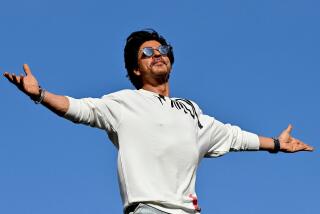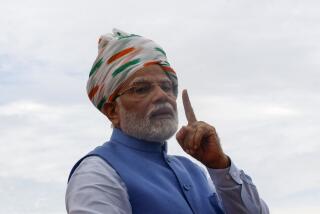‘Millionaire’ Is the Taj Mahal of Indian TV
- Share via
NEW DELHI — Come 9 p.m., Mondays to Thursdays, big cities and small townships across India look as if they have fallen under some sort of military curfew. The streets are empty, shops are closed, a lone diner here or there eats in isolation at a sidewalk canteen.
The majority of Indians are home, or at a neighbor’s, gathered around a television set, watching as yet another compatriot gets to sit in the hot seat on a studio set that would look suspiciously familiar to most Americans.
“Who Wants to Be a Millionaire” is now in dozens of countries worldwide. But nowhere has it become the cultural and social phenomenon as it has in India.
In this teeming, populous nation, people trying to run a business are in an unprecedented situation. Theater operators are pushing back curtain times from 9 to 10:30 p.m. to woo back patrons. Restaurants are calling Star Plus--the satellite channel on which the Indian version of “Millionaire” is screened--demanding that they take the show off the air as it has killed their nighttime trade.
Even the national telephone system is being overloaded, with some 10 million calls jamming phone lines every day, from people desperate to get on the show.
India’s answer to Regis Philbin is a man seen as something of a demigod in the country, its most famous living person. Amitabh Bachchan, a tall, lanky, onetime movie superstar with a distinguished graying beard, a soothing, deep voice and undeniable star appeal, has been largely credited with driving the success of “KBC.”
Bachchan said he would only be involved in the show provided it was up to international standards, according to sources. So along with a team of Star TV executives, he was flown to London, where he was given a firsthand look at how “Millionaire” is produced. Once he was assured that the format would be exactly replicated in India--with Indian producers being trained in London and vice versa--he came on board.
*
Since it went on the air in early July, “Kaun Banega Crorepathi?”--or “KBC” as it is now commonly referred to--is, hands down, the most successful show in the history of Indian television. (Literally, “KBC” translates to “Who Wants to Be a Crorepathi?”--a crorepathi being someone who has in excess of one crore, which works out to around $222,000.)
“We really only made allowances for 300,000 phone calls a day, so we caused a bit of chaos with the Indian phone system,” said Steve Askew, executive vice president of programming for Star TV, based in Hong Kong. “It is a phenomenon, there’s no other way to describe it. It’s out-rated any World Cup cricket final, which has so far been the biggest draw card on Indian television. It would be the equivalent of telecasting the Super Bowl four nights a week, hosted by Harrison Ford. It’s that sort of comparison we’re looking at.”
At a middle-class home in Churchgate, Mumbai, on a recent Monday night, the cook and maidservant made sure the dishes were cleared and washed so they could huddle in the doorway of the living room, enjoying “KBC” with members of the household.
In an upscale neighborhood in Delhi, Priya Paul, the president of the Park Hotel chain, said the appeal of the show is based on its “slick” factor--and the fact that it has “normal people.”
“Just regular, fairly unglamorous people who get the chance to win, and everyone loves winning. Plus Bachchan is a huge attraction,” Paul says. “People get to see their idol close up and see how human he is. It’s quite addictive.”
Clearly, millions of Indians agree with her. “KBC” is basically a franchise of the original “Millionaire,” devised by British production company Celador. According to a spokeswoman for Celador, the terms of the agreement--as it is with the other 29 countries that “Millionaire” has been exported to--stipulate that the format must be “almost identical” across the board: same music, set, lighting, format. The only difference, of course, is the language--and the host.
Still, Bachchan is just one component in the monumental success of the show. According to Askew, Indian viewers also immediately took to the “sense of drama” that pervades “KBC,” instead of the “flashing lights, fast action and buzzers” that are part of most game shows.
“It’s not about the money,” said Askew, who conceded that while the chance to win a crore was definitely a draw, it wasn’t the only one. “We have India’s biggest movie star, a multimillion-dollar advertising campaign and something that has never before been seen on Indian television,” he says. “When we decided to switch from an English-Hindi channel to an all-Hindi channel, we knew we had to hit our viewers with something big.”
Compared to international “Millionaire” ratings, which attract an average of 30% to 40% of the audience in Europe, “KBC” is now attracting as many as 90% of the viewing population in cities like Kanpur, and a minimum of 85% in metropolitan cities such as Mumbai.
Sponsors and advertisers are reportedly flinging money at the show, and Star has just tied up a deal with a confectionary maker for an off-air association said to be worth tens of millions of dollars. And in the bargain, the cachet of Star as a whole has been raised: On the back of the success of “KBC,” increasing audience numbers are watching the slew of Hindi soap operas on Star Plus, or the American shows (“3rd Rock From the Sun,” “Ally McBeal”) on its sister channel, Star World.
*
Now, of course, competitor channels are struggling to catch up. Sony Entertainment Television, the Indian offshoot of L.A.-based Sony Pictures Entertainment, is reportedly planning to develop Indian versions of “Wheel of Fortune” and “Jeopardy!”--and wants Bachchan at the helm. In the meantime, Australian company Nine Broadcasting, whose CEO is James Packer, is also reportedly wooing Bachchan to star in an Indian version of its game show, “Greed,” where contestants stand to win the equivalent of $2 million.
But not everyone is taking the craze that seriously: MTV in India has decided to spoof the show, with something called “Kaun Banega Kangal?”--literally, “Who Wants to Be a Pauper?” MTV host Cyrus Broacha dresses as a tramp and instead of money being dished out, winners get to fly to Dubai, where presumably, once they buy all that cheap gold, they will become paupers indeed.
More to Read
Sign up for Essential California
The most important California stories and recommendations in your inbox every morning.
You may occasionally receive promotional content from the Los Angeles Times.









